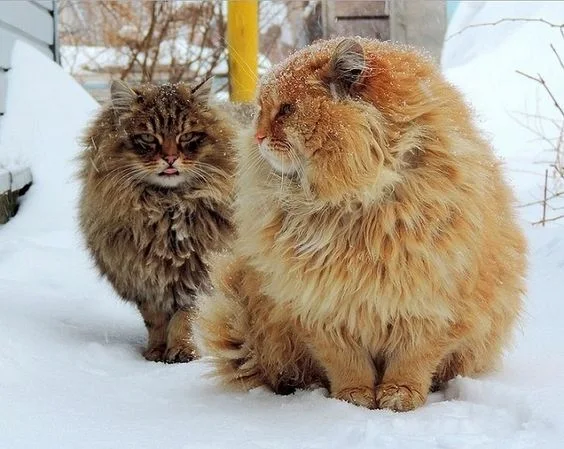Do domestic cats feel the cold? There are six topics to be addressed in answering this question.
Wildcat ancestor from hot climate
Firstly, the North African wildcat is the wild ancestor of the domestic cat. That wild cat's attitude towards the cold and towards heat is within the domestic cat. And the North African wildcats as you can imagine live in a very warm climate.
 |
| Do domestic cats feel the cold? Yes, of course but they tolerate it better than humans. Image: MikeB |
Feline behaviour
This is why the domestic cat likes to be in a warm environment. That's why they like to be on your lap if they are lap cats. That is why they sleep in the airing cupboard where the hot water cylinder is. That is why my cat is right now in a utility room where the boiler (furnace) is situated.
We know that domestic cats like warmth. They seek it everywhere all the time. Therefore, by definition, they dislike cold. That's the first point.
Tolerant
The third point is that domestic cats are very tolerant. They are less complaining than humans. They are more tolerant of pain and distress. There are more tolerant of extreme conditions. That does not mean they don't feel the cold, it just means that they tolerate it better than humans at a psychological level. Their brain processes the feeling of discomfort, in this instance through being cold, better than humans do.
You will find stories on the Internet of domestic and stray cats being frozen to the ground, literally. In these instances, sometimes, when the cat has been rescued, they've had to amputate their paws because of frostbite. A horrible thought.
And of course, feral cats in many parts of the world survive winter in freezing conditions. That's why nice people who operate TNR programs provide feral cats with little homes which are insulated so they can at least feel warmer during those very cold days and nights.
Cat coats
We therefore know that domestic cats feel cold but they tolerate cold better. And one reason why they are better able to tolerate cold is because they have a permanent overcoat on them 👍✔️.
Clearly, some cats are better protected in this regard than others. The longhaired cats with a downy undercoat are going to feel less cold than sleek, single-coated cats.
The well-known Maine Coon cat example has a shaggy, semi-longhaired coat because they originate in the state of Maine as barn cats. They were semi-domesticated in that state, before they became show cats, in the 1800s and before.
 |
| Siberian cats. Image in public domain. |
The Siberian purebred cat is another example of a domestic cat with a history of coming from a cold part of the world. They have coats designed for cold climates.
Evolution
Arguably they will be too hot in warm homes and in warm climates. A thought. An interesting further thought is this: Siberian cats and Maine Coon cats (for example - there are other breeds) would not have evolved through natural selection to have these warm, longhaired coats unless nature recognised the fact that they needed to keep warm and in doing that nature obviously agreed that they feel the cold. Evolution has protected these cats from cold conditions. It is, therefore, an admission that domestic cats and semi-domestic cats feel the cold.
Nervous system and anatomy
It has to be said that the anatomy of the domestic cat is really very similar to that of humans in very many ways. And certainly, in terms of feeling and detecting cold their nervous system and brain is very similar to that of humans. This strongly supports the idea that domestic cats feel the cold.
Longhaired feral cats
Interestingly, you will find that there are very few feral cats that are long haired because the gene that creates long hair is recessive. That means two carriers of the gene are going to have to meet and procreate to produce a litter of kittens that are longhaired.
Most feral cats you see will be shorthaired. And they will feel the cold. But in feeling the cold, as mentioned, they process it in a way which enables them to accept it without complaint

No comments:
Post a Comment
Your comments are always welcome.
Note: only a member of this blog may post a comment.